Businesses that have worked hard to implement a successful recycling program deserve to be recognized for their efforts. They have the opportunity to inspire other businesses to reduce waste and increase recycling. The recognition and publicity that businesses will earn in this program can serve to promote and enhance their reputations in the community.
All Lincoln and Lancaster County businesses or non-profit organizations who have applied and been accepted into the Recycle Lincoln Leadership Recognition Program are eligible.
Arbor Day Foundation
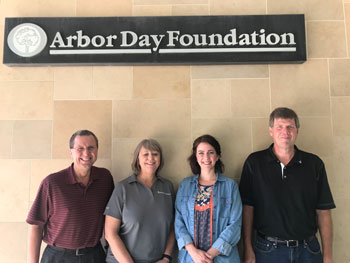 Pictured, from left to right: LeRoy Rock, Cindy Allgood, Carrie Marshall, and Tedd Enck
Pictured, from left to right: LeRoy Rock, Cindy Allgood, Carrie Marshall, and Tedd EnckThe Arbor Day Foundation has achieved a ZERO WASTE designation through WRRAP and the Recycle Lincoln Leadership Recognition Program, leaping from diverting 77% of their waste from landfills in 2018 to diverting 96% in 2019. This achievement is largely due to the Foundation increasing the pounds of waste it composts by a near 500% per month — a feat accomplished through the implementation of a large-scale composting program and team member education. Their environmentally-conscious culture and work with the Nebraska Recycling Council have further helped them address important questions about how they can better divert waste from the landfill and help the environment.
After a waste audit in March of 2017, the Arbor Day Foundation started a composting program, hoping to enhance their already exemplary efforts in single-stream recycling and to divert even more waste from the landfill. Their program collects food waste and compostable plates from events and sends them to local composting farm Big Red Worms, where they are eventually broken down and become nutrient-rich soil. Arbor Day Foundation IT Coordinator Carrie Marshall noted that barriers to recycling, such as engagement in efforts and public misconceptions regarding plastic film (grocery bags), are still there, however, they’re making strides to overcome them through frequent education and training on how to recycle right.
We’ve seen a significant decrease in their waste costs by implementing different services and collaborating with business tenants, such as Panera Bread and neighbors WRK, LLC., Qdoba, and T-Mobile.
Through their recycling program, the Arbor Day Foundation has also received continued positive feedback from team members for their sustainability practices. For other organizations who are interested in implementing a recycling program, the Arbor Day Foundation advises them to focus on teaching those who don’t practice recycling or composting how to get started and how to use bins properly: “We had employees work with the Nebraska Recycling Council to sort the trash every morning for a week, and we were able to visibly see how much waste and trash can be easily diverted [from landfills].” Carrie also recommends doing a waste audit and reaching out to other businesses that have implemented similar sustainability practices for advice.
Assurity
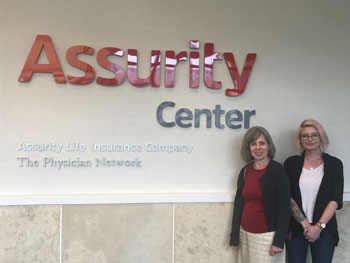 Assurity Sustainability Task Force members Lisa Hoffman, left, and Breana Rima
Assurity Sustainability Task Force members Lisa Hoffman, left, and Breana Rima
Assurity employees achieved a GOLD designation through the City of Lincoln’s Waste Reduction and Recycling Assistance Program (WRRAP) and the Recycle Lincoln Leadership Recognition Program in 2022 by diverting 66% of their waste from landfills.
“It all started in 1975 with one employee taking the initiative to start aluminum can recycling and then paper,” said Lisa Hoffman, an Assurity Sustainability Task Force member.
The Sustainability Task Force was formed in 2009 to educate associates on green practices established at Assurity as well as ones they can use at home. Its members explore and recommend new sustainability ideas that Assurity may want to implement.
In the following years, Assurity’s recycling efforts expanded significantly with the construction of their corporate office two years later. Assurity Center was designed to minimize its environmental impact, earning the U.S. Green Building Council’s LEED Gold Certification.
The company’s greatest challenge to recycling correctly was educating their approximately 400 employees on recycling best practices. Lisa also noted that with the move into their new headquarters, a system for recycling was incorporated into the design of workspaces. Assurity has supported employee understanding of recycling through quarterly “Lunch and Learns,” on-site recycling drives, and easily accessible recycling and sustainability resources on an internal company website, including information on what types of waste are recyclable.
Assurity’s recycling program is rooted in its commitment to sustainability.
“It’s the right thing to do,” said Tammy Rogers, Assurity Sustainability Task Force Chair. “Our company has a commitment to being a steward in the community and looking toward what the best thing for the City of Lincoln is down the road.”
Assurity employees also participate in often overlooked recycling efforts within the community. These efforts include participating in the Recycle Holiday Lights Drive with Eastridge Elementary School and the Colgate® Oral Care Recycling Program, which recycles items such as empty toothpaste tubes, toothbrushes and packaging.
General recycling is low-hanging fruit; we try to educate and raise awareness on [other waste issues such as] ‘if you don’t need it, don’t buy it’ to make our efforts more far-reaching to reduce the impact on other tiers of the waste stream.
For local businesses that are looking to implement similar recycling practices, Hoffman recommends providing education and clear, easily accessible resources for employees. She also suggests reaching out to other companies that have an established recycling program, and to stay connected with community entities that handle recycling such as the Nebraska Recycling Council.
Habitat
In 2019, Habitat, a kitchen and gift store in Lincoln, achieved ZERO WASTE designation through the City of Lincoln’s Waste Reduction and Recycling Assistance Program’s (WRRAP) Recycle Lincoln Leadership Recognition Program, by diverting 97% of their waste from the City’s landfill. Habitat’s owner, Jana Clark, has always been passionate about the environment, and strives to incorporate sustainability into the store to create a long-lasting impact on the community.
According to Jana, what started as simply recycling cardboard has evolved to include other paper products, plastics, glass, and composting. In addition to their retail business, Habitat also offers wine and vinegar tasting. However, the plastic used for holding samples proved difficult to recycle due to the food contamination, prompting a switch to compostable cups. Easy-to-read containers, employee instruction and training, and simplicity have eliminated many of the obstacles in implementing successful recycling and composting programs and Habitat employees have fully embraced these practices, with many incorporating sustainability into their lives outside work. In addition to their exemplary recycling and composting practices, Habitat sells a wide range of items that are made from recycled materials or promote waste reduction through sustainability and reuse.
Becoming a ZERO WASTE business did not happen overnight or without its hurdles – it required both financial and time commitments. “It’s a progression,” Jana said, “We started small; once we were familiar and comfortable with the process, we trained our staff on recycling right practices. It became easier.” Jana’s advice for local businesses looking to implement similar recycling practices is to start small and set a precedent within the company for what the expectations are, follow-up with employees through training and education, while remaining flexible to make adjustments.
The waste audit and suggestions from the City offered information on how take Habitat’s recycling to the next level.
Additionally, Jana noted that the support of WRRAP allowed Habitat to invest in larger, appropriately-sized recycling containers, reducing the amount of trips to the local composter from three times a week to just one. WRRAP support additionally allowed Habitat to purchase compostable liners, keeping containers clean and the processes easier. A sense of stewardship and pride has made developing a successful recycling program worthwhile for Jana, especially seeing the positive impact it’s had on her employees, customers, and the community.
Morrow Collision Center
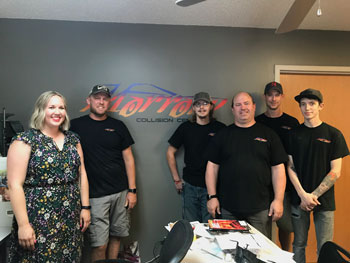 Left to right: Steph Terry, Tom Morrow, Cade Schimonitz, Dain Johnston, Brent Bivens, Christian Heuke
Left to right: Steph Terry, Tom Morrow, Cade Schimonitz, Dain Johnston, Brent Bivens, Christian Heuke
Morrow Collision Center earned a GOLD designation in the City of Lincoln’s Waste Reduction and Recycling and Recycle Lincoln Leadership Recognition programs, diverting 78% of their refuse from landfills in their first year of participation.
“We didn’t know about the programs until we found some resources online and realized that we’re already putting in the effort to reduce our what we throw away and increase recycling,” says Steph Terry, Morrow Collision Center’s Community Impact Director. We thought, “why not be a part of a program that we’re already comfortable doing?”
Owners Dan and Julie Morrow, originally from Tekamah and Howells, Nebraska, opened for business in Lincoln in January 2002.
We’re in an industry that produces a lot of waste,” says Steph. “It’s a standard that you recycle as much as you can.
Collision centers often have to find unique solutions for disposing of car parts such as bumpers, doors, plastics, and sheet metals, among others. Recycling these materials is not always easy and often requires specialized forms and the use of national companies that only pick up materials twice a year. Despite these barriers, Morrow Collision Center continues its astounding recycling efforts.
“The amount of trash that we have is impossible to ignore. Nobody would be comfortable throwing the amount of waste we have in the trash,” says Steph.
She also noted that seeing their recycling program in action is often important for customers.
Recycling is important to us because we’re a local business. We feel lucky that we’ve been around since 2002 and want to give back to our community in some way; we’re very conscious of our community’s future.
In addition to recycling all kinds of metals, Morrow Collision Center also recycles a high volume of cardboard, tires, auto glass and plastic parts. Several times a year, the collision center hauls bumper covers to a local facility where they are ground up into small chunks to be used to make other products.
To businesses that are looking to implement similar recycling practices, Steph recommends taking an in-depth look at the amount of waste they produce and working with their trash and recycling haulers, including asking the essential questions of “what’s recyclable and what’s not.” Communication is also key. As Morrow Collision Center prepares to open their second location on North 83rd Street this fall, Steph notes they plan to implement more formal recycling training and expectations for employees.
The Eatery
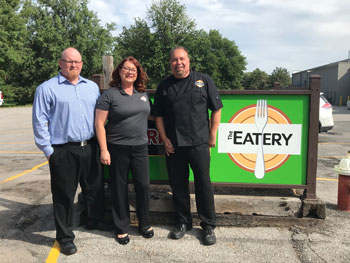 Left to right: Lonnie Jorgensen - General Manager, Michelle Daize - Owner, and Doug Daize - Owner
Left to right: Lonnie Jorgensen - General Manager, Michelle Daize - Owner, and Doug Daize - Owner
In 2019, The Eatery, a restaurant in Lincoln specializing in homemade American comfort food, achieved GOLD designation through the City of Lincoln’s Waste Reduction and Recycling Assistance Program’s (WRRAP) Recycle Lincoln Leadership Recognition Program, by diverting 81% of their waste from the City’s landfill. Owners Michelle and Doug Daize, and General Manager Lonnie Jorgenson, are passionate about incorporating sustainability into their business, including the use of recycled building components, such as doors and tiles, when they remodeled their building prior to opening. “We wanted to save as many things from the landfill as we could and maintain the legacy of the restaurant,” Doug said.
The Eatery’s recycling program has continued to evolve over time by implementing oil recycling, composting, and reducing the amount of styrofoam they use by switching to paper and recycled plastic products for their to-go containers. Each container includes a message to customers that reflects The Eatery’s commitment to sustainability, including information on how to reuse and recycle the container. This transition didn’t come without its hurdles, however, with a 200% increase in the cost of new packaging compared to the styrofoam alternative. “We took several months to research,” said Michelle, “We considered the end user and went with a product that’s durable, microwaveable, dishwasher safe, reusable, and easily recycled.”
Restaurants by nature produce tremendous amounts of waste, but striving to be sustainable is engrained in The Eatery’s company culture. “It feeds really well into the current generation’s culture and makes it easier for us to implement our recycling program and be successful in it,” Lonnie says. Michelle also noted that it’s easier to list the things that The Eatery doesn’t recycle, which is limited to waste such as glass and nitrile gloves. Plastic straws are available to customers by request-only, reducing their overall straw usage in the restaurant by 90%. Additionally, all food waste and used hand towels from the restaurant are composted.
We want to be environmental supporters, not sabotagers. There’s intangible benefits in doing our part for future generations.
Although implementing a recycling program can be costly and requires long-term commitment, Doug’s advice for businesses is to “Make a plan, follow-through, and train employees. You need to commit and complete by starting small with one goal to implement and work your way up.”
Zipline Brewing Co.
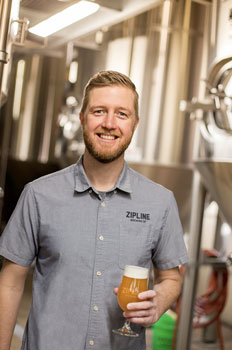 Pictured: Marcus Powers, Chief of operations, Zipline Brewing Co.
Pictured: Marcus Powers, Chief of operations, Zipline Brewing Co.
Zipline Brewing Co. has achieved a ZERO WASTE designation through the WRRAP and the Recycle Lincoln Leadership Recognition Program, making an impressive leap from diverting 78% of their waste from landfills in 2018 to diverting 98% in 2019.
Zipline’s impressive commitment to sustainability has resulted in a company-wide emphasis on recycling. From sending used grain to local farmers for feed, to replacing lighting with a more efficient LED alternative, Zipline has created a company-wide culture that they hope will extend beyond the brewery and into employee’s homes.
Our commitment to recycling reminds our staff about our priorities for protecting our local community and the bonds we have with Lincoln.
Chief of Operations Marcus Powers explained that Zipline feels a great responsibility to reduce their waste stream and energy use to preserve this great community for future generations. As a small-market local brewery, Zipline’s success relies on Lincolnites supporting local beer, therefore, Zipline feels they need to reciprocate that support by doing what they can to minimize their environmental impact on the community.
Interestingly, Zipline felt that initiating their recycling program was a relatively easy undertaking. While such barriers as added costs are typical to small businesses when initiating a recycling program, Marcus explained that they found that those costs were immediately offset by lower garbage bills as their waste streams were virtually eliminated.
Finally, when asked about challenges in reaching their Zero Waste status, Marcus stated that as Zipline grew, following through on teaching their staff to remain committed to recycling was tough. However, he stressed, “Start simple, and then follow through”. He felt that while it is very easy to begin a recycling program and the costs are relatively low, it’s also easy for a recycling program to not be properly utilized by staff. By using regular staff reminders and holding short training sessions to ensure everyone understands the importance of recycling, you can empower your employees and create a culture that focuses on sustainability and good recycling practices.